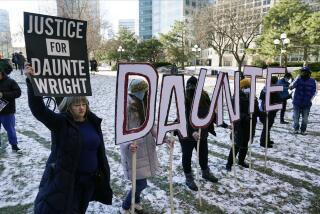Anticipated South African Reform Steps Inadequate, Visiting U.S. Lawmaker Says
- Share via
JOHANNESBURG, South Africa — The political reforms South Africa is preparing to announce this week are unlikely to eliminate the causes of continuing civil unrest here, Rep. Stephen J. Solarz (D-N.Y.) said Monday after meeting with President Pieter W. Botha in Pretoria.
“The totality of what appears to be under consideration seems to me to be fundamentally incompatible with any real hope for solving the political problems of South Africa,” Solarz said at the conclusion of a weeklong visit.
Although he had hoped that the minority white regime was taking a “new approach” to resolving South Africa’s problems, Solarz said that what Botha told him showed no changes “that could be seen, in my view, as significant by the blacks in this country or by the world.”
Botha’s reported comments to Solarz, if they reflect the substance of his scheduled Thursday address in Durban to the Natal provincial congress of the ruling National Party, seem certain to dash hopes both here and abroad of a broad new initiative toward political, economic and social reforms that would end apartheid, South Africa’s legal system of racial discrimination.
Solarz, a critic of the regime here and a proponent of economic sanctions against South Africa, said he went into his meeting with Botha expecting to hear pledges of rapid reform, similar to those he said were given to the Reagan Administration last week and to himself in previous discussions with South African Cabinet members. Instead, Solarz said, his meeting with the president “would make a cold shower seem warm.”
The South African press speculated widely in the past week that Botha would announce implementation of such measures as a common citizenship for South Africans of every race, some political power-sharing within the central government, major modifications of the “pass laws” that keep blacks from coming to work and living in the cities, and negotiations with black leaders on further reform measures.
Similar speculation abroad--encouraged by the White House in Washington and the Foreign Office in London after U.S. and British officials met last week in Vienna with South African Foreign Minister Roelof F. (Pik) Botha--went even further. That speculation mentioned moves to abolish at least some tribal homelands, to repeal the basic segregation law--called the Group Areas Act--and to free Nelson Mandela, 67, the jailed leader of the outlawed African National Congress.
Solarz said that he asked Botha about the continued imprisonment of Mandela, first jailed in 1961 and serving a life sentence for sabotage and subversion, and that Botha compared Mandela to convicted Nazi war criminal Rudolf Hess, 92, who is still held in Berlin’s Spandau Prison. Botha said Mandela is being held for the same reasons as Hess and indicated that he will not be released soon, Solarz said.
‘Monstrous Atrocities’
This comparison was “totally without validity or foundation,” Solarz said later at a press conference, because Hess “was convicted of some of the most monstrous atrocities in the history of the human race.”
Mandela has become “a mythic figure” who must be included in any national convention on the country’s future, Solarz said.
Winnie Mandela, the black nationalist leader’s wife, said on Monday through their attorney, Ismail Ayob, that the government has not approached them about his release and that they do not expect him to be freed. Mandela refused in February to renounce violence in the fight against apartheid, saying that only free men can negotiate and that he would not accept any conditions for his freedom.
Botha’s comments to Solarz seemed to be reflected in a commentary on Radio South Africa today, which said that this country should proceed with selected reforms at its own pace, not hurried by either spreading civil unrest or foreign pressure.
“Some people are losing sight of the fact that the reform program has a particular character that dictates the kinds of reforms that can be expected and that is itself dictated by the realities of the South African system,” the commentary said. A text of the commentary was distributed in advance Monday.
‘Cooperative Structures’
Arguing that South Africa is “a society of minority groups,” the commentary said that these must be protected in any constitutional reform through still-undeveloped “cooperative structures.”
“That is the pattern into which all constitutional initiatives of the past decade and more have fallen, and into which present and future reforms must fit.”
This suggests more political structures, like those in the new constitution that established a tricameral legislature with Indian and Colored, or mixed-race, chambers as well as white.
More to Read
Sign up for Essential California
The most important California stories and recommendations in your inbox every morning.
You may occasionally receive promotional content from the Los Angeles Times.










